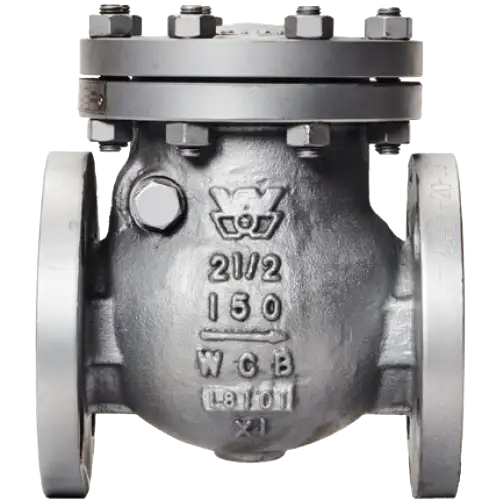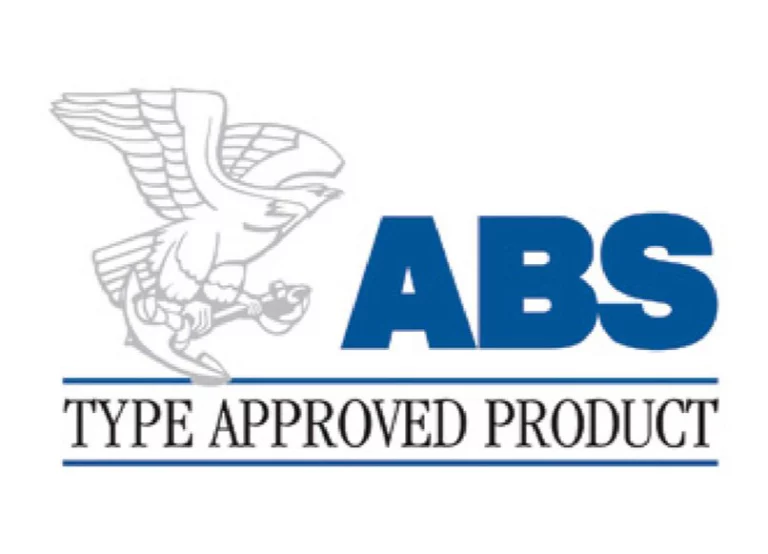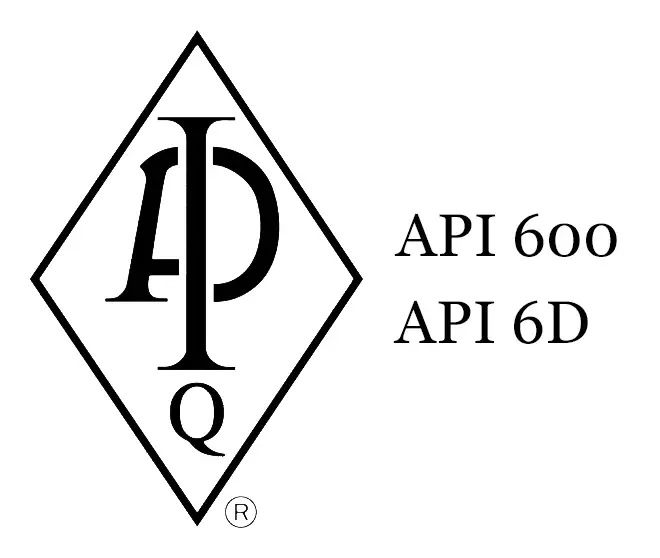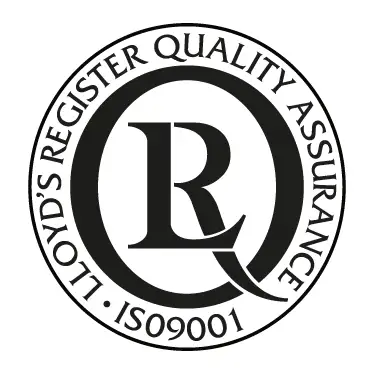Industrial and Commercial Check Valves
 Check valves, sometimes called non-return valves, allow fluid flow in one direction only. Their primary function is to prevent backflow in a piping system, which is critical for safety, efficiency, and equipment protection.
Check valves, sometimes called non-return valves, allow fluid flow in one direction only. Their primary function is to prevent backflow in a piping system, which is critical for safety, efficiency, and equipment protection.
Choose Williams Valve for unmatched quality and reliability in industrial and commercial check valves. With a century of expertise, we offer custom valve manufacturing to essential
Primary Applications for Check Valves
Check valves provide protection in many different types of piping systems, such as:
- Oil & Gas Pipelines: Prevent reverse flow in pipelines, protecting compressors and preventing line packing or depressurization issues.
- Process Industries (Chemical, Petrochemical, Pharmaceutical): Crucial for preventing mixing of incompatible chemicals, protecting sensitive equipment from back-contamination, and ensuring one-way flow in reaction and transfer lines.
- Water Treatment Plants: Prevent backflow of treated water into raw water systems or during filter backwashing cycles.
- Power Plants: Used extensively in steam, condensate, and cooling water systems to maintain flow direction and protect turbines and pumps.
- Boiler Feedwater Lines: Prevent hot boiler water or steam from flowing back into the cold feedwater supply when the feed pump stops.
- Pumping Systems: Installed on the discharge side of pumps to prevent pumped fluid from flowing back into the pump when it shuts off, which could cause reverse rotation, damage, or loss of prime. This is common in water supply, wastewater treatment, and chemical transfer.
Cast Steel Drawings
Stainless Steel Drawings
Forged Steel Drawings
Bronze Drawings
Is a Check Valve Right for My System?
Deciding if a check valve is the right fit for your system involves understanding its fundamental purpose, limitations, and the specific demands of your application.
- Pulsating Flow: Requires specific designs to prevent rapid opening and closing (chatter).
- Flow Velocity: Critical for proper operation. Too low a velocity can lead to chatter or failure to fully open; too high can cause excessive wear.
- Orientation: Some check valves are sensitive to installation orientation (horizontal vs. vertical).
- Slamming: A significant concern in large pipelines or with rapid flow reversal, requiring features like external dashpots, spring assistance, or specific valve types to mitigate.
- Pressure Drop: Must be factored into system design to ensure adequate pressure at the point of use.
Our Check Valve Design and Materials
Unlike other valves that require an external actuator, check valves operate automatically, opening or closing based on a pressure differential. They can’t be manually opened or closed or modulated to control flow rates. Their action is entirely dependent on the system’s fluid dynamics. Forward flow pressure pushes the closure element open, while backflow pressure pushes it closed against a seat, creating a seal. Preventing backflow is their sole and most critical function, as backflow can cause contamination, equipment damage, or even a full system malfunction.
All check valves do introduce some degree of pressure drop into the system as the fluid must overcome the resistance of the closure element. The design influences the magnitude of this pressure drop.
We manufacture piston check, ball check, and swing check valves. Our check valve construction incorporates:
- Full Port or Standard Port
- Spring (available on request)
- Bolted Bonnet with Spiral-Wound Gasket, Threaded and Seal Welded Bonnet, or Threaded and Pressure Seal Bonnet
- Socket Weld Ends or Screwed Ends (NPT)
Forged Steel Check Valves
Our forged steel check valves are available in three bonnet designs:
Bolted Bonnet
- Male-female joint
- Spiral wound gasket
- Made of F304L/graphite
- Ring joint gasket available on request
Welded Bonnet
- Threaded and seal welded joint
- Full penetration welded joint available on request
Pressure Seal Bonnet
- Threaded and pressure seal bonnet joint
Body Materials
Material options for valve body manufacturing include:
- Bronze: Smaller lines, water, plumbing, low-pressure steam.
- Carbon Steel: High-pressure, high-temperature general industrial.
- Stainless Steel (304, 316): Corrosive fluids, food and beverage, pharmaceutical, hygienic applications.
- Alloy Steels: Extreme temperatures, pressures, or highly aggressive media.
Design and Manufacturing Compliance
Our check valves conform to:
- API 602 – Gate, Globe, and Check Valves for Sizes DN 100 (NPS 4) and Smaller
- BS 5352 – Steel Wedge Gate, Globe and Check Valves of Nominal Sizes 50 and Smaller
- ASME B 16.34 – Valves—Flanged, Threaded, and Welding End
- API 598 – Valve Inspection and Testing
- MSS SP-25 – Standard Marking System for Valves, Fittings, Flanges, and Unions
- MSS-SP-118 – Compact Steel Globe & Check Valves – Flanged, Flangeless, Threaded & Welding Ends
- ANME B16.34 – Valves – Flanged, Threaded, and Welding End
- ASME B16.11 – Forged Fittings, Socket-Welding and Threaded (for Socket Weld Ends)
- ASME B1.20.1 9 – Pipe Threads, General Purpose (for Screwed Ends)
Types of Check Valves Available
- Cast Steel Swing Check Valves 150lb – 2500lb
- Forged Steel Piston Check Valves 800lb & 1500lb
- Forged Steel Flanged Piston Check Valves 150lb, 300lb, & 600lb
- Forged Steel Swing Check Valves 800lb & 1500lb
- Forged Steel Flanged Swing Check Valves 150lb, 300lb, & 600lb
- Stainless Steel Swing Check Valves 200lb WOG
- Stainless Steel Flanged Swing Check Valves 150lb, 300lb, & 600lb
- Bronze Marine Flanged Bolted Cover Swing Check Valves 150lb
- Bolted Bonnet Swing & Piston Check
- Corrosion Resistant Bolted Bonnet Swing Check
- Pressure Seal Bonnet Swing & Tilting Disk Check
- Through Conduit Swing Check
- Forged Steel Swing, Piston & Ball Check
- Cryogenic Bolted Bonnet Check
- Marine Swing Check – ABS Type Approved
- Mil-Spec Swing Check
Check Valve Types – Quick Overview
There are various check valve designs available. Each one has slightly different advantages for controlling fluid flow direction based on the intended application.
Piston Check Valve (Lift Check Valve)
These valves feature a precisely guided piston that lifts vertically off its seat when forward flow pressure is sufficient. When flow stops or reverses, gravity and/or a spring force the piston back onto the seat to block backflow. Some designs include a dashpot to prevent slamming.
Piston check valves are known for providing a very tight seal, so they are ideal for high-pressure applications where minimal leakage is critical. They are often used with steam, high-pressure gases, and in systems that need rapid closure.
They generally have lower pressure drop than ball checks but higher than swing checks. They can often be installed in both horizontal and vertical (upward flow) lines.
Ball Check Valve
This valve is a simple design where a free-floating or spring-loaded spherical ball rests on a conical seat. Forward flow lifts the ball, allowing passage. Reverse flow or cessation of flow causes the ball to drop back onto the seat, sealing the valve.
Ball check valves are highly reliable due to their minimal moving parts. The self-cleaning wiping action of the ball can make them suitable for viscous fluids or those with suspended solids. They are often compact and can be installed in different orientations, especially spring-loaded versions. They tend to have a higher pressure drop compared to swing checks.
Swing Check Valve
This valve utilizes a hinged disc (or flapper) that swings open with forward flow and closes by gravity or back pressure when flow stops or reverses. Swing check valves offer a full, unobstructed bore when fully open, resulting in minimal pressure drop, which is highly desirable for systems with high flow rates or where energy efficiency is a concern. They are less suitable for pulsating flows as the disc can chatter, which leads to premature wear.
These valves are typically installed in horizontal lines, though some designs can accommodate upward vertical flow. They are able to handle fluids with some suspended solids better than piston checks.
Manufacturing and Modification for Industrial Check Valves
At Williams Valve, we deliver custom, high-performance industrial and commercial valve solutions for all critical applications. Maintain the integrity of your system with our trusted valve products. Contact us to learn more.





